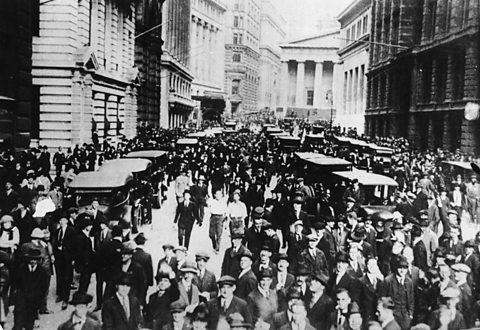British industry in the 1920s
In the 19th century, Britain led the world in industrialisation. Towards the end of the century Germany, France, Japan and the USA had all caught up, and by the beginning of the 20th century were beginning to overtake and challenge Britainâs industrial dominance.
They used new methods of production and competed for international markets. British coal, iron, steel, shipbuilding and textiles industries relied heavily on selling to worldwide markets. The increased competition from the other countries meant that the 1920s were not comfortable times for British heavy industry.
Wall Street Crash
The Wall Street Crash caused enormous concern to the US president, Herbert Hoover, and resulted in a dramatic period called the Great Depression.

How did this lead to a depression in Britain?
The Depression in the USA also had a major impact on the UK economy. American economic policies resulted in numerous other countries, including Britain and Germany, sliding into an economic slump.

President Hoover used high tariffs to try to stop American consumers buying goods from other nations. These tariffs made these non-US goods more expensive, and thus led to a decline in demand and profits.
The phrase When America sneezes, the rest of the world catches a cold
appears to be an accurate one. This means that what happens in America affects the rest of the world.
The main trigger of the Depression was the Wall Street Crash, but other factors also helped to create the Depression.
Perhaps it deserves to be called a catalyst, as it speeded up the impact of the other causes and speeded up the economic downturn.
This led to companies collapsing, especially as the heavy industries in particular had been struggling since 1918. Companies closing or reducing their workforce led to severe unemployment.